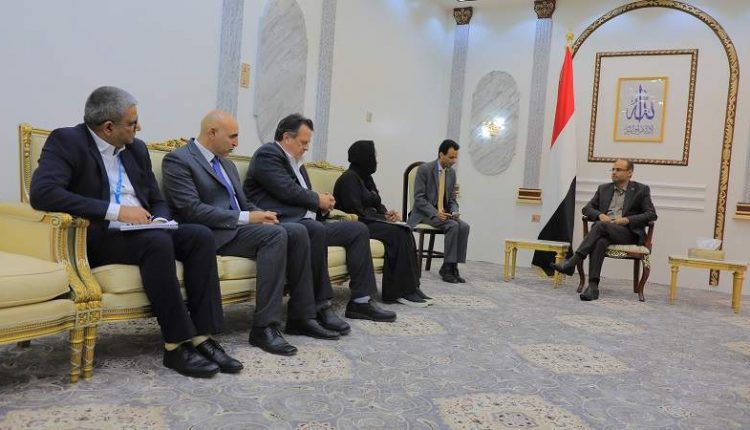Al-Mashat: Yemeni People Will Not Accept Its Rights to Be Confiscated
Yemeni President Mahdi Al-Mashat explained that it is not possible to accept any proposal confiscating the rights of the Yemeni people, pointing out that “whoever rejects the rights of Yemeni people is the one who rejects the truce.”
This came in a meeting, Wednesday, with Assistant Secretary-General for Humanitarian Affairs – Deputy Emergency Relief Coordinator Joyce Msuya, and Tariq Talahmeh, Deputy Director of Operations and Director of the Middle East and North Africa Division at the United Nations Office for the Coordination of Humanitarian Affairs in New York.
The meeting discussed the difficult humanitarian conditions of the Yemeni people for the last eight years in light of the US-Saudi aggression and the unjust siege.
The meeting touched on the obstacles placed by the US-led aggression coalition to thwart the efforts to extend and expand the truce to deprive the Yemeni people of obtaining their salaries and lifting the siege, which is one of the most basic human rights guaranteed by all the laws of the world.
During the meeting, President Al-Mashat urged the Assistant Secretary-General for Humanitarian Affairs to reject all inhumane measures taken against the Yemeni people.
He stressed that any proposal to confiscate the rights of Yemeni people is not acceptable, pointing out that whoever rejects the rights of the Yemeni people is the one who rejects the truce.
President Al-Mashat clarified that the Yemeni people are the first affected by the continuation of the US-Saudi aggression and the unjust siege, reiterating Sana’a’s position that adheres to a just and honorable peace.
The meeting was attended by Alexandra Jackson, Yemen Affairs Officer in the Operations and Advocacy Division of the Office for the Coordination of Humanitarian Affairs.
A UN-brokered truce lasted for six months in the seven-year-old war waged by Saudi Arabia and its regional allies supported by US and western countries against Yemen.
The truce, however, expired on Sunday amid the Saudi-led coalition’s constant violations of the agreement and its refusal to properly lift a siege that it has been enforcing against Yemen since the beginning of the war.
The US-Saudi aggression, with UN complicity, is still evading the implementation of humanitarian and legal entitlements, foremost of which is the paying employee salaries and entering fuel ships to the port of Hodeidah, which made Sana’a refuse to extend the temporary truce.
In Hodeidah, the Saudi-led aggression violates the UN-backed agreement, reached between the warring sides during a round of UN-sponsored peace negotiations in Sweden in December 2018, on a daily basis.
The agreement committed the parties to an immediate ceasefire in the city of Hodeidah and the ports of Hodeidah, Salif and Ras Issa, redeployment of forces, securing the ports, the establishment of the joint Redeployment Coordination Committee chaired by the United Nations, and the use of the revenues of the ports to support civil service salary payments.
The continuous violations by the forces of aggression in Hodeidah come in light of an international silence identifying the aggression and its crimes against the Yemeni people.
Last month, the Yemen Petroleum Company (YPC) said in a statement that, “The total fines for delaying fuel ships seized by the US-Saudi aggression amounted to 11 million dollars during the truce period”. The company reiterated that the US-Saudi aggression continued to piracy on all fuel ships, without exception, and to seize them since the announcement of the temporary truce.
The company explained that the fuel ships are still being held by the US-Saudi aggression for varying periods, a total of 314 days since the announcement of the truce agreement, in addition to the delay in Djibouti for a total period of more than 152 days.
It stressed that during the truce period (April-September), only 33 fuel ships out of 54 ships reached Hodeidah ports, of which only four were released on August 2, at the end of the first extension period of the truce.
The statement stated that fuel shipments incurred delay fines during the truce period, amounting to 11 million dollars due to piracy, detention and delaying their entry to the ports of Hodeidah.
It pointed out that the number of currently detained fuel vessels has reached nine fuel vessels, all of which have UN entry permits.
The YPC confirmed that the complicity of the relevant UN formations with the US-Saudi aggression seriously contributes to the exacerbation of explicit violations of the truce agreement.
It pointed out that this complicity became an actual participation in the siege through the coordinates sent by the UNIVM to the ships authorized to go to the detention area and stay there, waiting for a permit to allow them to reach the ports of Hodeidah.
The YPC holds the US-Saudi aggression and the UN responsible for all the direct and indirect humanitarian and economic consequences and repercussions resulting from the continuation of the strict blockade on fuel ships.

